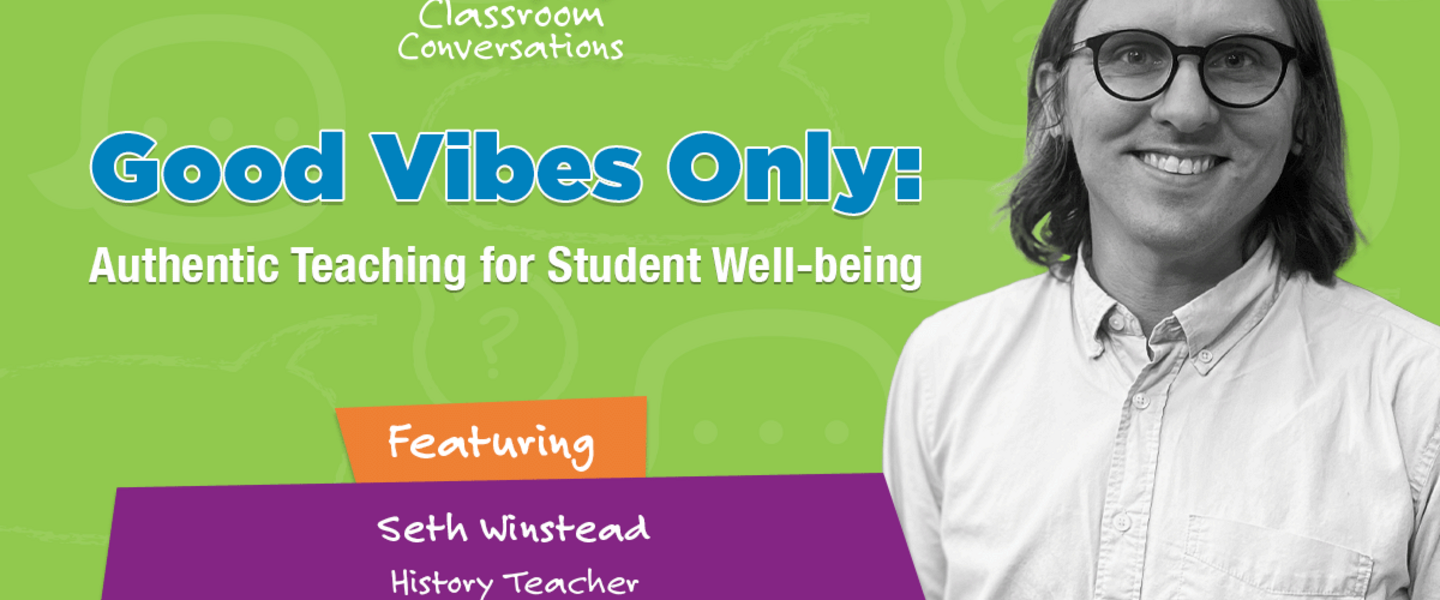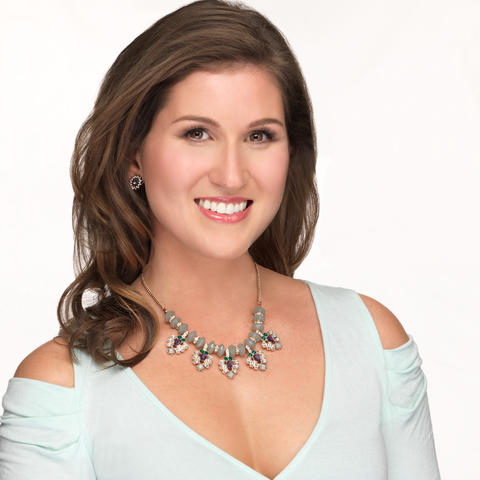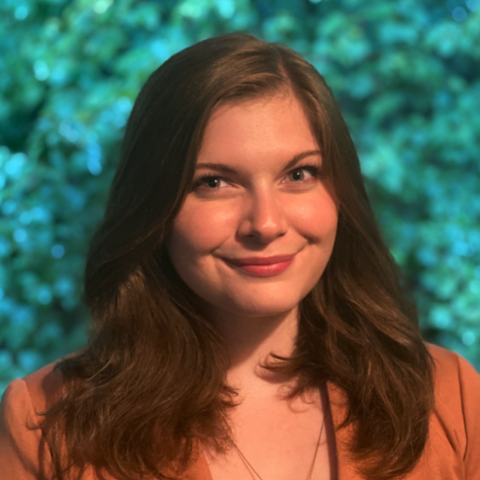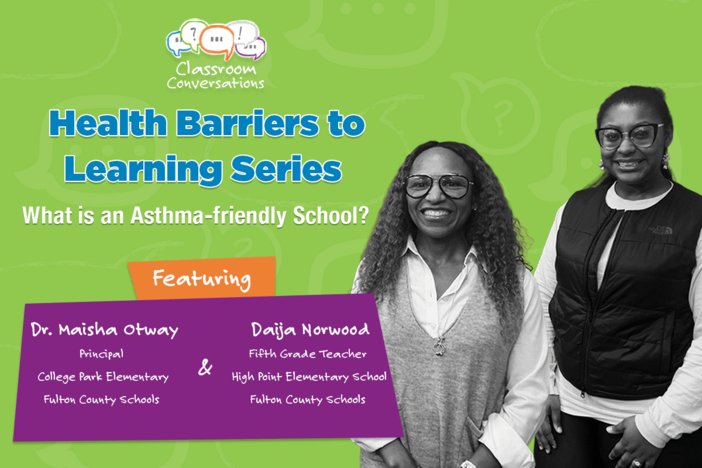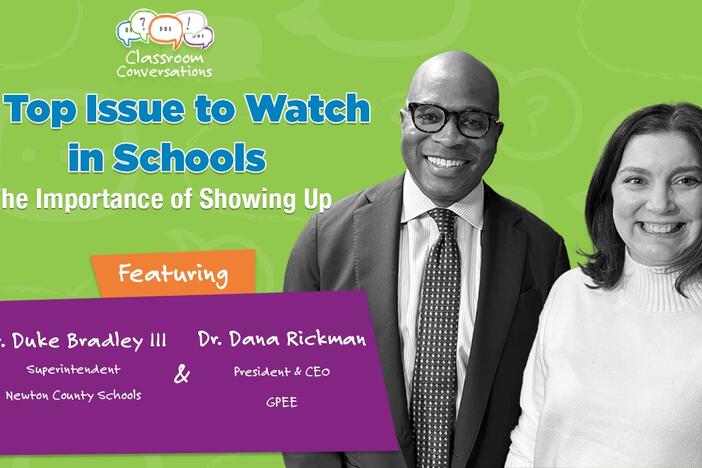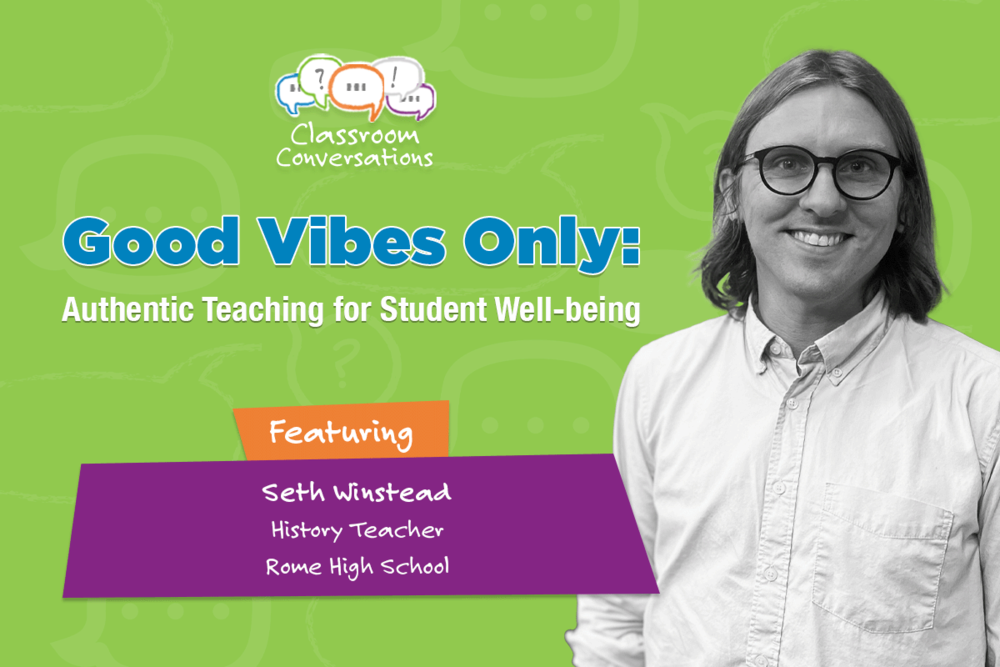
Section Branding
Header Content
Episode 423: Good Vibes Only: Authentic Teaching for Student Well-being
Primary Content
Improving student well-being improves their educational experience! Join us in conversation with Seth Winstead of Rome High School to learn more.

Improving student well-being improves their educational experience! Join us in conversation with Seth Winstead of Rome High School to learn more.
Click here to watch this episode on YouTube.
TRANSCRIPT
Ashley Mengwasser: Hello, how are you? Ashley Messenger here with a healing episode of Classroom Conversations, the platform for Georgia's teachers. Classroom Conversations is brought to you by the Georgia Department of Education and Georgia Public Broadcasting, the ultimate K-12 education content creators. It's a good vibes only kind of podcast. So vibe check, what are the vibes in your world today? If they're anything beneath good, don't you worry. Your energy will reposition in about 30 minutes because today's topic feels fantastic. We're talking about supporting students' mental health and well-being in the classroom. When you meet my guest today, you'll soon understand it starts with the vibes of the place. Vibes are defined by the Oxford Languages Dictionary as either one, a person's emotional state, or two, the atmosphere of a place as communicated to and felt by others. It's all about atmosphere. My guest today is the ultimate vibes guy, regarded highly for the milieu of his classroom. And it's not because what he teaches is unchallenging from the standpoint of students. He may promote mental health in the classroom, but he says his is probably the most stressful class his students have, the kind of subject kids are going to the counselor for. 13-year educator Seth Winstead is a teacher of high intensity history at Rome High School where he teaches AP US history and AP comparative government to 11th and 12th graders. As a teaser, you'll highly vibe with Seth's episode if you have an affinity for plants, trivia, and egalitarianism. Thanks for leaving your happy place to enter into ours, Seth, how are you today?
Seth Winstead: I'm well, how are you?
Ashley Mengwasser: You're well. Of course you are. You're the vibes guy. Did I market you appropriately?
Seth Winstead: I think you may have hyped me up a lot. Yeah.
Ashley Mengwasser: Well, you have to in a high vibe episode. I think you speak for yourself though. You were clearly made for the classroom in my opinion, Seth. Was school your favorite spot as a young kid?
Seth Winstead: Well, so I would not say that it was my favorite spot, no. And I was homeschooled, so-
Ashley Mengwasser: Ironic.
Seth Winstead: But even the schoolwork was probably not my favorite, but I definitely enjoyed learning. I think that was my favorite part as a child.
Ashley Mengwasser: You enjoyed learning. And how did you get into history? Why that discipline selection?
Seth Winstead: Well, I didn't know what else to study. I had no direction in life. I was in college and I sat down for a syllabus day for my one history elective. I heard the professor read his syllabus and just something clicked and I went, "Okay, this is what I want to do with my life. I want to study this."
Ashley Mengwasser: History.
Seth Winstead: And I changed my whole schedule that day to take-
Ashley Mengwasser: Did you really?
Seth Winstead: ... All history classes.
Ashley Mengwasser: Oh my gosh. How old were you at that time?
Seth Winstead: Like 19 maybe.
Ashley Mengwasser: Okay. So this is going strong, this love of history.
Seth Winstead: Yeah. It been pretty strong for a while now. Yeah.
Ashley Mengwasser: Okay, amazing. A vibes guy like you, Seth, must have some interesting components to his life, I would guess. So would you tell us a few facts about yourself and your talents?
Seth Winstead: So, my talents are few, few and strange. I can balance two sets of silverware on my face at once.
Ashley Mengwasser: Wait, we need to pause for that. What does that look like?
Seth Winstead: It looks like a couple of knives and a spoon all on my nose.
Ashley Mengwasser: Wow.
Seth Winstead: Yeah. Thankfully I got my grandmother's nose, so-
Ashley Mengwasser: So that helps with your talent.
Seth Winstead: That helps with the talent. Yeah.
Ashley Mengwasser: I would consider that a talent. Do you perform that for your history students?
Seth Winstead: No. No. And every once in a while, if I get bored at the dinner table though, to my wife's chagrin-
Ashley Mengwasser: You can pull it out.
Seth Winstead: ... The boys and I will end up all trying to... All of us.
Ashley Mengwasser: They're all trying to put silverware on their faces.
Seth Winstead: Yeah.
Ashley Mengwasser: Now have your young historians in class looked to see if there's a Guinness world record around this topic? Because-
Seth Winstead: No, and hopefully they don't.
Ashley Mengwasser: I was going to say you should-
Seth Winstead: I don't know if I can challenge for that one.
Ashley Mengwasser: Okay. Tell me more quirks about yourself.
Seth Winstead: So, we have four kids, four boys at home who are, I refer to them as the four horsemen because you'll hear them coming from a mile away.
Ashley Mengwasser: Like hoofs prints.
Seth Winstead: Yes, absolutely. And I think I once got a speeding ticket on a bicycle, which was completely rigged and not at all real, but it was a life goal. And so I-
Ashley Mengwasser: To get a speeding ticket on a-
Seth Winstead: ... Sort of pressured a campus security guard-
Ashley Mengwasser: To getting a ticket.
Seth Winstead: To watch me go past the speeding sign and issue me the citation.
Ashley Mengwasser: Were you speeding in fact? Whether it was sprint or not.
Seth Winstead: I was going a mile over.
Ashley Mengwasser: One mile over.
Seth Winstead: It was like 26 in a 25.
Ashley Mengwasser: What did you do with that ticket? Did you frame it?
Seth Winstead: It was on our refrigerator for several years.
Ashley Mengwasser: Okay.
Seth Winstead: Achieving one's dreams.
Ashley Mengwasser: One's dreams. Yes. Well, where your positivity is certainly moving at the speed of light, why do you think mental health support is so critical for your high school student body population?
Seth Winstead: Oh, that's a great question. I think that so much of what they're experiencing life is, there's a lot that's competing to distract them. Yeah, they get called screenagers.
Ashley Mengwasser: I've never heard that.
Seth Winstead: One of my students said, "Oh, you're going to call the screenagers next." And I was like, "That's just a wonderful term. And it's not at all true."
Ashley Mengwasser: It's clever though.
Seth Winstead: It's clever. But the problem is they get maligned for being on their phones, but really it's a whole system. It's all of us. We are all a little bit too addicted to our technology and problem.
Ashley Mengwasser: Right. It's a universal problem.
Seth Winstead: Technology is, yeah, it's meant for consumption. It's not meant for producing. It's not really meant for communication. If my phone goes off and it's someone calling me, I'm like, "Why do I have to use this voice feature of this device?" And so, there's a lot competing for distraction. Last year I challenged my students to spend just 30 minutes, put all of your devices, all of your screens, televisions, everything, put it away, put it in a drawer, and go just spend 30 minutes thinking about yourself and your place in the world and what your goals are. Learn a new skill for 30 minutes or talk to your family or just discover something new. And the results were pretty great. They came in very positively saying, "Hey, we were thinking about how we interact with culture, who we are, and how we're spending our time." Somebody learned how to crochet or started to, but then another person said, "I tried to talk to my family, and it turned out they were all on their phones-
Ashley Mengwasser: On their phones.
Seth Winstead: ... And I couldn't have that conversation." And they're at this point where these apps, it's scroll, consume, scroll, consume, listen, believe this, think that. But they're at a point in their life where they're trying to figure out what they believe for themselves. They're trying to distinguish truth. And if there's no time to reflect, then it's hard to find out who you really are. And so I think mental health, I don't want to turn this into a phone thing, it's not a phone thing, it's not a device thing. I just think that it's important that we realize that at this point of where they are in their lives, they need time to reflect and to-
Ashley Mengwasser: To be.
Seth Winstead: ... Think through big questions.
Ashley Mengwasser: Right. Well, now that I know your feelings on this, I'm going to have to sporadically call you now and then just because of the tension I know that will erupt within you. Could you name three what you would consider good vibes components for teachers to invite into their classrooms and maybe three not such good vibes components that maybe teachers should keep out of their classrooms?
Seth Winstead: Yeah. So for me, I think making sure as a teacher you're approaching your lessons and your classes authentically. Some people have asked me, "How do you do this? Or how do you do that?" before, and I'm always happy to help and give advice, and I'm always happy for people to come watch me teach. But I always give the caveat that we are not each other and what works for me may not work for someone else, but I'm going to approach it in a way, approach my lessons and my students in a way that I'm going to be honest about who I am and I'm not going to put up a front. I'm not going to put on a facade for them. And so I think authenticity goes a long way. It doesn't mean you have to get really personal, but just to be who you are-
Ashley Mengwasser: Right. Be you.
Seth Winstead: ... And teach in the way that is real for you to be able to teach in.
Another thing is making sure that your room is student focused.
Ashley Mengwasser: Interesting.
Seth Winstead: I go a little bit overboard with this. I begged for three years for them to take my teacher desk out of my room, and they finally did it. It was like the happiest day of my life.
Ashley Mengwasser: What's there instead?
Seth Winstead: Nothing. It's student desks and that's it, and I have a little bookshelf where I can put my stuff. And so the point was forcing myself to be amongst them because the students are the reason that we're there. The lessons are about them. It's not about us as the teacher, it's about them as the learners. And so, anything that you can do in your classroom to make sure that you're having meaningful engagements with them for the maximum amount of time that you can engage with them goes a long way in building trust and building relationships with them. I asked my students what they would say to some of these questions and they said, "You should tell them that you promote mental health by turning the lights down."
Ashley Mengwasser: That is so good. They can be harsh in color temperature and the effect on the brain is not always positive. Whereas a more modulated lighting...
Seth Winstead: Yeah, some nice little warm lamps, it goes a long way.
Ashley Mengwasser: Yeah. That feels good for the soul.
Seth Winstead: Absolutely.
Ashley Mengwasser: So, they're like, "Tell them about your lighting design."
Seth Winstead: Yeah. So I've turned the lights fairly low and then I have lamps all over my classroom.
Ashley Mengwasser: Love lamp light, very good.
Seth Winstead: And the goal is just to make it feel like home, make it feel like a safe place, which doesn't mean that everyone needs to go put lamps in their classroom, but anything you can do to make sure, again, that the students feel sort of warm and welcome-
Ashley Mengwasser: It's inviting.
Seth Winstead: ... Will go a long way.
Ashley Mengwasser: Yeah. I guess you can't have candles because of the fire element.
Seth Winstead: No, I wouldn't trust teenagers around candles anyway.
Ashley Mengwasser: Good point. Good point. Little pyromaniacs. But we could just do the kind of LED little votives and put it in a candle.
Seth Winstead: Yeah, we did a speed dating assignment recently.
Ashley Mengwasser: Did you?
Seth Winstead: They were historical figures. We were not setting up students. They were historical figures, finding ideological matches in history.
Ashley Mengwasser: Interesting.
Seth Winstead: And last year we had some little battery-powered candles.
Ashley Mengwasser: There you go.
Seth Winstead: As Frederick Douglass and Elizabeth Cady Stanton talk to each other in my classroom.
Ashley Mengwasser: Right. So it sounds like your students and you both agree kind of the things to keep out that are less than good vibes, it would be anything harsh, anything harsh about yourself, maybe things you're rejecting in yourself. Harsh lighting. I know for me it's like if I wear an outfit I don't like, that affects my energy all day.
Seth Winstead: Yeah. And I think it could even be something as simple as busy work. Which sounds like pragmatic classroom practices thing, but I think it goes a long way to everyone wants to feel like what they're doing is meaningful. And so, the more that you can bring students on board and have them finding meaning in what you're doing in your classroom, whatever it is that you're studying, as long as they feel that it is valuable, they're going to feel like it's worth becoming curious about. So I try to stay away from... We do a lot of work.
Ashley Mengwasser: Of course.
Seth Winstead: We work very hard in my classroom.
Ashley Mengwasser: I hear, yeah.
Seth Winstead: But it's meaningful work. It's work that is worthwhile in investing time in.
Ashley Mengwasser: And you're "in the trenches" with them to use a history term because you've removed your desk and you're right there on the floor with them.
Seth Winstead: Yes. It really forces you to walk around and see where they're struggling or where they're succeeding. That's really fun seeing the light bulbs going off and being able to talk through what their issues are with whatever it is we're grappling with at the time.
Ashley Mengwasser: Yeah. There is a lightness in your energy that is so inviting, Seth, I have to say. And one of the things you said that I loved, I wrote it down, you say that "If you want students to learn, they need to feel safe and secure." And we're going to hear today exactly how you do that with some of these awesome tips. But you're here today actually because your student Kai nominated you as a classroom mental health champion, and that is a serious honor to be nominated by a student. What was your relationship like with Kai? Who's Kai?
Seth Winstead: So, Kai, he was in my wolf pack, that's what we call our homeroom. And those homeroom students stay with us for four years. So from my first day at Rome High School was his first day at Rome High School.
Ashley Mengwasser: Look at that. Destiny.
Seth Winstead: And then I sponsored FCA at our school. He was one of our FCA leaders. He took my AP US history course. So for four years, I don't know if I gave him much guidance, but I was there through the process of him sort of figuring out where he was going to go in life and thinking through college decisions. So I think I was a peripheral figure through that. Hopefully I was a steady presence there.
Ashley Mengwasser: Absolutely. In terms of the qualities you espouse and the way you present yourself, why do you think Kai did nominate you? You certainly found yourselves in the same place, not by happenstance. I think he was kind of following your light. So what do you think it is?
Seth Winstead: Gosh, that's a very good question for Kai.
Ashley Mengwasser: Yes.
Seth Winstead: When I got the email about this, I was a little bit surprised because I'm not... Like if you picture this sort of glowy, always bright side sort of nurturing person that's like... I'm not really that, but I try to make sure that my students know that they're safe in this, in my classroom-
Ashley Mengwasser: Yes.
Seth Winstead: ... It doesn't mean we're not going to joke around, but they joke right back with me. And there's a mutual respect in my classroom that I hope students pick up on.
Ashley Mengwasser: I think there is just an easy acceptance that you offer people that I think just must be very inviting for students. What are some of the actual practices that you do in your classroom to promote and support mental health and well-being in students?
Seth Winstead: Well, one of the main ways to deal with anxiety or issues of... For me in my experience it's been anxiety, is curiosity.
Ashley Mengwasser: Yeah. Oh, good.
Seth Winstead: And so, I try to structure my lessons in a way that students are always dealing with questions, that they're taking the time to separate themselves from themselves. We are always looking in the mirror now or we're looking at people's best images of themselves, whether it's on Instagram or just what we allow people to see of us in the hallways.
Ashley Mengwasser: So curated. Yes.
Seth Winstead: It's very curated. And so what about admitting that we don't know information, we don't know, not only what, but we also don't know why, and then being able to be free to seek out those answers. And so a lot of that looks like discussions, Socratic seminars, student-led things for the most part so that they're engaging, they're leading the learning, and they're taking ownership of their own understanding.
Ashley Mengwasser: Yeah, beautiful. And one of my favorite things that you do, there's no place like home. What if you could make your classroom feel like home?
Seth Winstead: Yeah.
Ashley Mengwasser: Tell me how you do that.
Seth Winstead: So, my first year of teaching, well in public school my first year of teaching, I'm a couple of months in and there's nothing like that first year of teaching to really make you understand that you want to be a teacher. And I found myself one day just not really understanding how to break through to my students that year. And I remember sitting there, and it was actually in the middle of church, and rather than listening, I was writing down the names of all of my students, each one of them, and realizing these are why I'm here. And I'm not here so that I can tell them everything they need to know. I'm here because they need to learn. And so how can I shift my teaching from what I'm doing to how they can learn? And so I've read online that students learn best where they feel at home. And if you make your classroom feel like a home, they will learn better in it. So that's when we started the lamps. We got a rug at that point.
Ashley Mengwasser: You have an area rug?
Seth Winstead: Well, I had an area rug. I don't have one anymore. It's been a few years now.
Ashley Mengwasser: I got you.
Seth Winstead: It got a little worn out.
Ashley Mengwasser: It got beat up. It's time for change.
Seth Winstead: Yeah, it got beat up. But then so we toned down the lighting. I got a houseplant, and originally we got the houseplant, we named it Diego.
Ashley Mengwasser: Diego.
Seth Winstead: The joke was that if you feel like you need to cry, you can cry into Diego because-
Ashley Mengwasser: Water Diego.
Seth Winstead: Right, water Diego, and then the next thing I know, students are coming over to the table and they're picking up this little peace lily and taking him to their desks not so they could cry into him, but just because they felt better with him there. So from there we got little bamboo plants and we have them in tea cups or coffee cups, and we have just various little... Like students have donated plants, so we call them our emotional support garden, which again, started out as a joke and then has become an actual thing.
Ashley Mengwasser: It is an emotional support garden.
Seth Winstead: It is a thing. So they'll come in and they're like, "That's my plant," and they'll take it to their desk. Yeah.
Ashley Mengwasser: There you go. And like a real garden, you've got to tend to those weeds and you've got to care for it and you've got to connect with your living creature of the plant like Diego. I love that Diego is a peace lily, what a metaphor, right?
Seth Winstead: Yeah. I guess so. I hadn't thought about that before.
Ashley Mengwasser: That's a beautiful thing, and you're just perpetuating the peace in your classroom. There is a lot of talk these days though, to just take it a little bit heavier. You mentioned student tears. They can go and put their tears in Diego and the other plants. There's a lot of talk about being trauma-informed. And for many, the word trauma can feel intimidating, but trauma-informed just means providing a safe and predictable environment, which we know that you value so much, being sensitive to the cues from your students. You've got that in the bag because you build relationships with them, you know what they're going through. And recognizing behaviors that may be related to trauma. What are some ways you do this in your classroom? Do you need a trauma training to do this? Or is it just in little ways you show up for them?
Seth Winstead: It's really just been trying to be empathetic to them. And it doesn't mean that I'm going out and trying to find out everything that's happening in their life, but just talking to them. And when you get to know students, you'll know the days they're having good days, and you'll know the days they're having bad days, and you'll understand the days that maybe they just need to talk in the hall for a second, or maybe they just need to be left alone for a moment. And so I try to make sure that each student, I know them well enough to pick up on those cues. As I said, everyone wants to be valued, and I think that goes a long way, that no student is invisible in the class, like every student is seen. Kai nominated me as a mental health champion, but I'm one person in one classroom. I have a really close relationship with some of our counselors at the school. Coming out of COVID, students... We were all, as you said, in the trenches at that point. None of us really knew everything that we were dealing with in that year. And I had students coming into what is a really intense class with the AP exam coming up and I'm trying to prepare them for that. And I had students just talking about how much despair they're in and how they just are questioning everything. And so one of the counselors and I, Ms. Burse and I, we say, "We went through it together that year," as I was just constantly having to say, "Hey, we have this student who's having this issue. We need to talk to them." And so I think a lot of it really comes down to being there for what they need from me in my classroom, but also making sure that they have the resources they need for coping outside of the classroom as well.
Ashley Mengwasser: That they're connected to the counselor.
Seth Winstead: That they're connected beyond just... Me as the teacher, I can only carry them so far. I'm there for a purpose, but I'm also only trained in so much. And sometimes they need additional resources, and it's important to be-
Ashley Mengwasser: A professional resource.
Seth Winstead: Yeah. Not in a scary way, but just to say, "Listen, I think maybe if you need a place to sit, maybe you could sit here or maybe you can talk to this person and they'll understand what you're going through."
Ashley Mengwasser: Yeah. Or go and grab Diego for just a little bit.
Seth Winstead: Or go grab Diego or your favorite little bamboo plant.
Ashley Mengwasser: Yeah.
Seth Winstead: Oh, I'm not a mental health professional. I have no expertise. I'm just a human being teacher trying to help my students in whatever ways I can. And for me, that comes in helping them to learn history and then building relationships with them. And I am always very quick to direct them to people who are experts if they find that they need it.
Ashley Mengwasser: What is admirable about that though is that you are, because you're aware and there's this heightened sensibility toward, "Is everybody good? How are you?" That you can catch them when they're down. So it comes down to empathy for you and good humor and some fun activities. Tell us about Trivia Night.
Seth Winstead: Oh yeah. So a few years ago I came up with the idea of how can we turn studying for an AP exam into a fun thing. And so we started hosting a Trivia Night, and we'll have, gosh, I think we had 50 kids there for the first time that we hosted it at Rome High this past year. And some of them did not really know what trivia was. And they came and they formed teams and we had pizza and sodas and they had picked the playlist, and it was on a Thursday night. It was a school night right before a break, and they come in and we ask questions about US history and comparative government, but we also have some sort of off the wall trivia questions.
Ashley Mengwasser: Some good pop culture stuff.
Seth Winstead: Really good pop culture stuff. Yeah.
Ashley Mengwasser: Yeah. So is this a regular event now?
Seth Winstead: We do it every year. We're going to do it our second year this coming year, but I've done it four or five years before that as well.
Ashley Mengwasser: Fantastic.
Seth Winstead: And they get a golden record. They get to put their picture on a golden record that hangs from the ceiling of my classroom forever is what I tell them. Forever.
Ashley Mengwasser: Forever. Yes. As long as it hangs there and they get to sign the record. So, I'm like, "You will be classroom famous if you win trivia night." Classroom famous is a good place to start. Does Trivia Night have a formal name or just Trivia Night?
Seth Winstead: Just Trivia Night.
Ashley Mengwasser: I like it so much. Not over complicate it.
Seth Winstead: No, we don't over complicate it.
Ashley Mengwasser: There is a great saying as it comes to students that it takes a village to graduate a student, which I'm sure you know so well. You're relying on the counselor and other relationships with your peers. In the way of mental health, are their partnerships within or beyond the school that you find important to support students wellbeing?
Seth Winstead: I think knowing your other teachers is important because oftentimes I can talk to the teacher who had them the year before me. I can talk to them or talk to the teacher who's going to have them the next year. Or we can let them know, "Hey, just keep an eye out for this person. How are they doing now?" The counselors are really... The counselors don't get enough credit in the world, the school counselors, because they deal with everything else in the school plus the counseling, and they're there to talk to parents and there to talk to students. So, I really cannot sing their praises enough. And then the more that we can get students engaged in the community, whether it's in school sports or drama clubs or whatever it might be, the better it is for them to feel that community themselves. The more that we are connected to each other in an increasingly isolated world, the healthier we're going to be.
Ashley Mengwasser: Right. That is a powerful support there. Is there a piece of advice that you would like to pass along to your fellow teachers regarding supporting the mental health and well-being of students?
Seth Winstead: Oh, another great question. I would just say don't be afraid to ask the big questions, even if you don't know the answers. Be authentic in your classroom. Let them know the real you. And also to help students to become curious. Just get them asking the questions and help them to look for the answers for themselves.
Ashley Mengwasser: I love the asking questions philosophy. Do they come into a question on the board every day?
Seth Winstead: They probably should, but no, not every day. But we ask a lot of questions in class.
Ashley Mengwasser: Just kind of brainstorming questions back and forth.
Seth Winstead: Brainstorming questions, yes. Yes. And sometimes essay questions which are not their favorites. So they question my-
Ashley Mengwasser: They question your questions.
Seth Winstead: Yeah. Yes. Yesterday they were doing that. Yeah.
Ashley Mengwasser: Is there a lesson that we can learn? I don't know if this is possible, Seth, just roll with me here.
Seth Winstead: Okay.
Ashley Mengwasser: Is there a lesson that we can learn from the subject matter you teach, from AP US history or AP comparative government about mental health, something that undergirds our mental health?
Seth Winstead: I think that history is the perfect subject for mental health.
Ashley Mengwasser: I'm shocked, honestly. I kind of made that one up.
Seth Winstead: No, I think it's the perfect subject for mental health. So often we're told to look at ourselves and think about ourselves, but history asks us to look at something greater than ourselves-
Ashley Mengwasser: Than ourselves.
Seth Winstead: I have a poster up in my classroom. It has a quote from GK Chesterton on it, and it says, "How much larger your world could be if you would become smaller in it." And I think history is perfect because it shows us that we're small players, we're pieces of fabric in a big tapestry. We're small in our scale, but also we are so important, right? It was all created for us, and we are in the end the point, even as we're working to something greater,
Ashley Mengwasser: There is something so relieving and so freeing when you just said that. It kind of makes you relax into your oneness as part of the whole. It's a beautiful thing.
Seth Winstead: Yeah. It's okay to just be and take the time to be and to think.
Ashley Mengwasser: Yeah. Put your phone down every once in a while.
Seth Winstead: That's right. Yeah.
Ashley Mengwasser: That's a good lesson.
Seth Winstead: Ask good questions.
Ashley Mengwasser: Thank you, Seth. You're a mental health support maven. We'll send all of our tears to water Diego. As you go, think of ways you can embrace a good vibes atmosphere in your classroom. How can you make it home-like? A safe, great environment for learning. You're already a great teacher. "Everything in life is vibration," said Albert Einstein. Vibrate with your students and watch them make mental health strides. I need to get a plant for the studio, and I'll have some time since we've reached our final destination. That's right. This episode concludes season four. Thank you to all of our participating educators and leaders whom we first included for the first time in this series. We began our season in episode 401, discussing the trauma-informed classroom. Go back and learn about hope givers if you haven't listened yet. It seems fitting that we should conclude our season with this episode about supporting students' mental health in the classroom. I can't say we'll be back next week with a brand new episode, but I can say we'll be back soon. I am delighted to divulge a development. Season five debuts in no time to enrich your next semester. We have some special additions to the show that will have you hearing from more educators across the state within each episode. So, follow this podcast and await our grand reveal. In the meantime, to recommend an educator for the podcast or to share a testimonial about how Classroom Conversations has enriched your instruction, contact us at education@gpb.org. I'm Ashley Messenger, your honorary educational enthusiast, and I will return to this microphone to lead us into topics untold in season five. I'll miss you, but it's not goodbye forever. It's goodbye for now. Bye-Bye.
Funding for Classroom Conversations is made possible through the School Climate Transformation Grant.
There is hope. If you are a loved one, need assistance, please call or text 988, Georgia's crisis and suicide lifeline.
